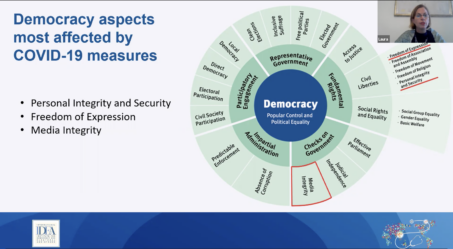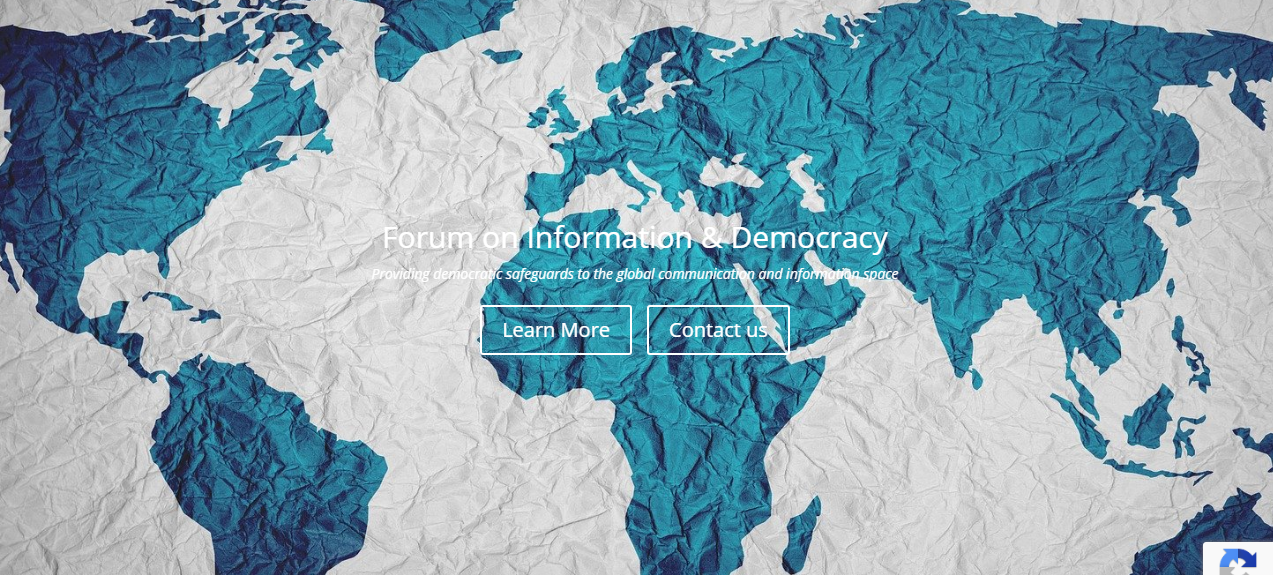Developing a Policy Framework & Mobilizing Political Will to Fight Infodemics
On September 29, 2020, the World Movement for Democracy invited a panel of researchers, scholars, and activists to discuss how to combat ‘infodemics,’ a pattern of rapidly spreading outbreaks of misinformation. This problem has become more pressing due to the recent increase around the world of crackdowns on journalism and restrictions on access to information during the COVID-19 pandemic. Panelists outlined research and policy propositions to combat infodemics and discussed strategies to connect technical solutions to the political will for implementation.

Research. International IDEA, an inter-governmental research organization, provided key insights in the Global Monitor of COVID-19 Measures on Democracy and Human Rights which assesses 162 countries on 29 indices from the Global State of Democracy Framework. IDEA Director Laura Thornton points out that media integrity, freedom of expression, personal integrity and security have declined due to the restriction of information and criminalization of ‘fake news’ during the pandemic. In fact, of the 162 countries, 70% of hybrid regimes, 60% of authoritarian regimes, and 40% of democracies have restrictions on “freedom of expression and media integrity.” Also, infodemics are often state-sponsored – the concealment and tampering of COVID-19 data has been noted in Cameroon, Laos, Egypt, Nicaragua, and Vietnam. With COVID-19 as an excuse to implement restrictions, regimes are manipulating media and freedom of expression policies to suit their political agenda.
Trends and Bodies for Change. The power of infodemics is rooted in the contentious management of virtual public spaces, points out Christophe Deloire, chair of the Forum on Information and Democracy. In the past, he explains, governments guarded key information sources such as newspapers, radio, and television through established democratic norms. Now, private online platforms control key information sources – but they have not assumed the responsibility of gate-keeping the trust and neutrality of information. The results are rampant disinformation, commodification of personal data, and other democracy-thwarting outcomes. In response, commissions like the International Declaration on Information and Democracy have mobilized researchers, policymakers, social scientists, and other key players to construct guidelines and norms as tools to defend democratic values in the online space. The Working Group on Infodemics researches transparency, meta-regulation on content moderation, platform design and reliability of information, and regulation of fake news on private messaging systems.
Solutions. Outside of research groups, global trends show increased legislative attempts to secure the freedom of expression and combat infodemics. Director of Center for Studies on Freedom of Expression, Agustina Del Campo points out that many Latin American parliaments modeled guidelines from the Inter-American court system to debate disinformation in digital spaces. However, changemakers must recognize that infodemics are a small symptom of a broader societal fracture. Antoine Bernard, Director of Reporters without Borders, calls for proponents of democracy to foster international partnerships within and between key parliaments to combat this increasingly borderless issue. Mark Nelson, Senior Director of the Center for International Media Assistance, adds that local civil society organizations can encourage dynamic public debate to rally support against infodemics. He emphasizes that this is an issue that affects the interests of citizens around the world, and thus the efforts for change will need multilateral and cross-institutional collaboration. There have been many recent efforts – the European Endowment for Democracy’s report on independent and pluralist media platforms, the EU’s work on social media moderation policies, and UNESCO’s resource center on misinformation that are cause for hope and pathways for change.
To learn more about the battle against Infodemics, read the Forum on Information and Democracy‘s latest report with 250 recommendations on how to end Infodemics here.

